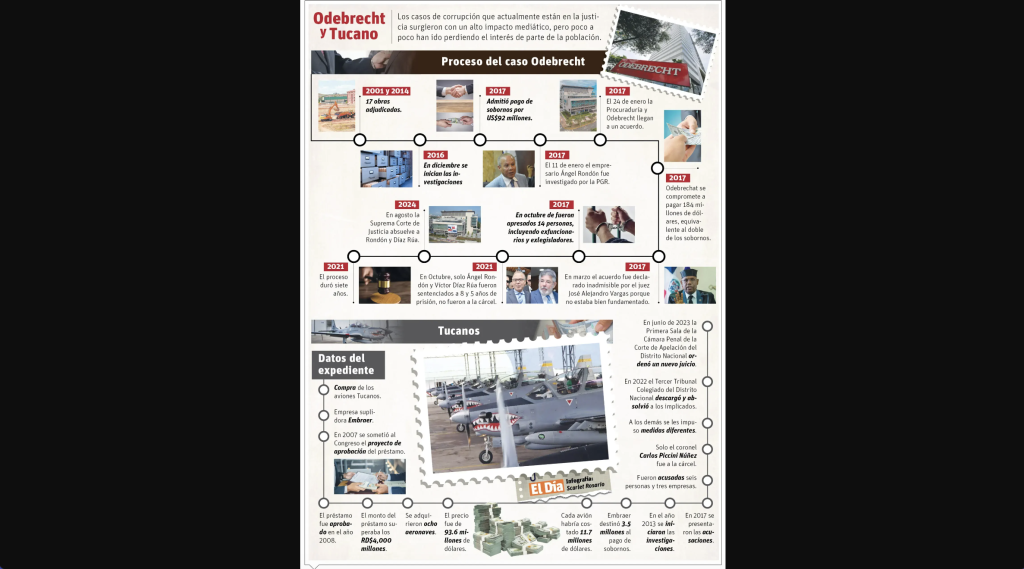
Both the Odebrecht and Tucano mega corruption cases that initially generated significant public interest and involved high-profile figures have ultimately resulted in the acquittal of all defendants when prosecutors have failed to present the hard evidence or defendants have found loopholes in the cases. These outcomes have raised questions about the effectiveness of the Dominican Republic’s justice system in prosecuting complex corruption cases, El Dia reports.
The story is published after the judiciary acquitted the only two remaining culprits in the case of the Brazilian construction corporation, Odebrecht, that admitted in a New York Court to paying US$92 million in bribes in the Dominican Republic.
El Dia reports that like fleeting pop stars who enjoy brief fame before fading into obscurity, the corruption cases surrounding the purchase of Tucano aircraft and contracts awarded to the Brazilian construction company Odebrecht have also vanished from the Dominican Republic’s public eye. These cases initially captured widespread attention and media coverage due to the involvement of high-ranking former officials and legislators, as well as the substantial amounts of public funds allegedly misappropriated.
Both cases share several commonalities, says the story in El Dia. They were first brought to light in the United States, involving the Brazilian companies Odebrecht and Embraer, both of which admitted to paying bribes in the Dominican Republic. Investigations into these cases were initiated under the leadership of former Attorney General Jean Alain Rodríguez, and both companies were subsequently fined by the Dominican government.
A striking similarity between the two cases is the acquittal of all defendants due to insufficient evidence, despite the prosecution presenting voluminous case files. While these extensive documents seemed to prolong the legal proceedings, they ultimately failed to provide the concrete proof necessary to secure convictions.
The Tucano Aircraft Case
The Tucano case dates back to 2007 when then-President Leonel Fernández proposed a loan of RD$4 billion to purchase eight aircraft from Embraer. In 2008, the Dominican Congress approved the financing, secured by the Brazilian National Economic and Social Development Bank (BNDES).
An investigation was launched in 2013 under the leadership of Attorney General Francisco Domínguez Brito, and in 2017, the prosecution led by Jean Alain Rodríguez formally charged six individuals and three companies. The defendants included former officials, businesspeople, and the companies involved in the deal.
After years of legal battles, a Dominican court ruled in 2022 that the prosecution had failed to prove the payment of bribes and acquitted all defendants. However, in June 2023, an appeals court overturned the acquittal and ordered a new trial.
The Odebrecht Case
The Odebrecht case was even more complex and protracted. The company admitted to paying $92 million in bribes to Dominican officials between 2001 and 2014 to secure contracts for 17 construction projects.
Formal investigations began in late 2016 under the leadership of Attorney General Jean Alain Rodríguez. Initially, over 20 individuals were implicated and investigated, but the list of defendants gradually dwindled to six who were brought to trial in 2020.
In October 2021, only Ángel Rondón and Víctor Díaz Rúa were convicted and sentenced to 8 and 5 years in prison, respectively, but they were not incarcerated. They were later acquitted by Supreme Court judges.
Several other corruption cases are in the judiciary, with the prosecutors presenting files with thousands of pages of incriminations that have delayed the procedures as these involve hundreds of witnesses, incriminated persons and their lawyers. It is yet to be seen if these will go the same route as the cases of Odebrecht and the Tucanos, and others before them.
Read more in Spanish:
El Dia
15 August 2024

